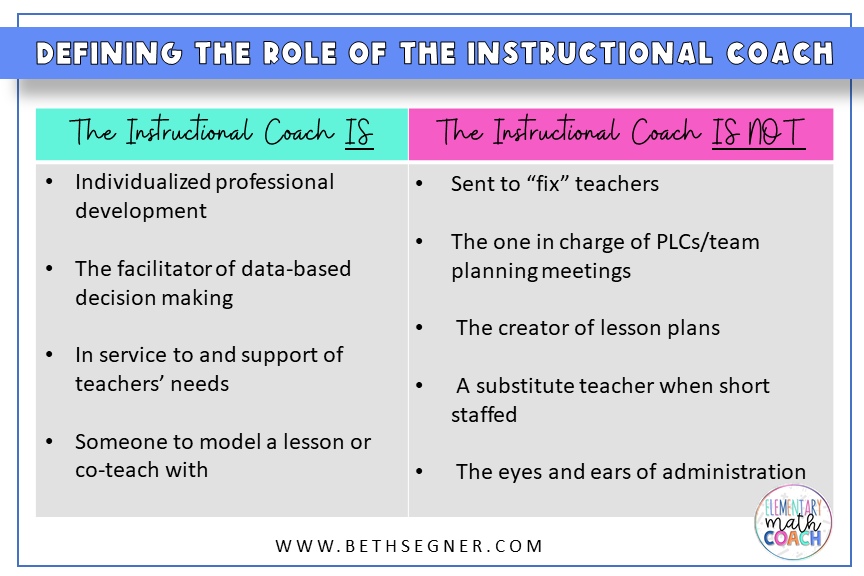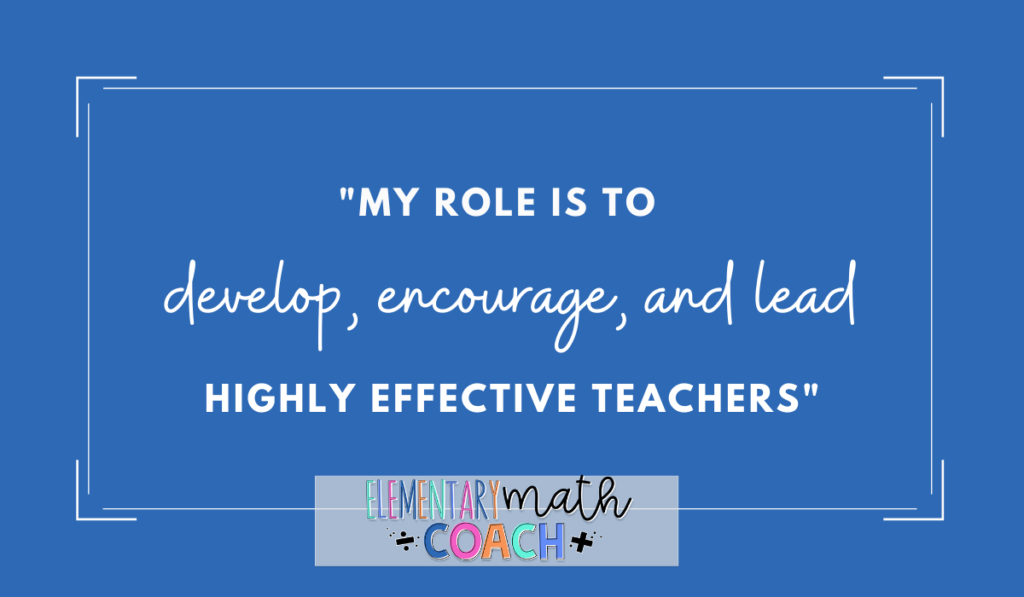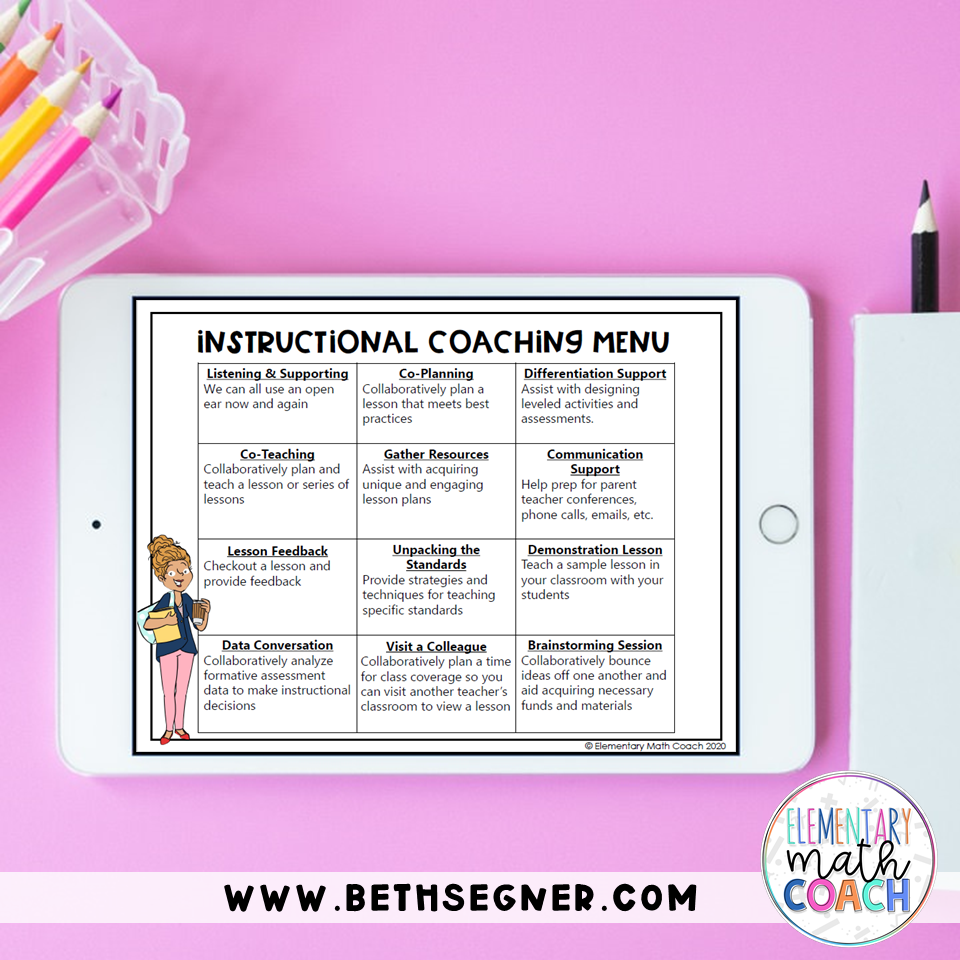I have heard/read hundreds of definitions of instructional coaching over the years. I think that Dr. Jim Knight (one of the pioneers in the field) said it best when he tweeted this definition back in 2019:
“Instructional coaches partner with teachers to: analyze current reality, set goals, identify and explain teaching strategies to hit the goals, and provide support until goals are met.”
It is simple, focused, and sounds easy right? Well… in reality there are a lot of other duties, tasks, and responsibilities that can be thrown your way to derail this perfect definition of coaching. The key to keeping the focus where you want it to be is all about defining your role. We will dig into why you need to define your role for yourself, for administration, and most importantly for teachers.

Defining Your Role For Yourself
Have you ever heard the phrase, if you don’t have a plan for your business it will have a plan for you? Or as teachers you may have a memory of a time that you were not planned for a class, so your students ran the show. The same is true for transitioning from a teacher to an instructional coach. If you are not clear within yourself on your role, goals, and why you are there it will not take long at all before you look around and realize you have lost control.
One of the joys and frustrations of the role of instructional coach is that it looks so different everywhere you go. There is no set schedule I can give you or perfect lists of jobs and responsibilities you can take back to your building and implement with ease. It is messy. It is trial and error. In some schools you may be handed a manual of “this is what I want you to do as the instructional coach” (however, I have yet to talk to anyone where this has actually happened before).
For most of us, we set the tone and have a say in how we structure our time and effect change in classrooms.
This in itself is a MASSIVE mental adjustment to take on when leaving the classroom where our entire workday was organized by time and handed to us to implement, no questions asked.
First, before talking to admin or teachers you need to clearly define your role and your impact within yourself. Make a bulleted list or one powerful sentence of what you think your role is as an instructional coach. I will share mine with you:

This simple thought is the main goal driving my work. At the end of the day I am proud of this role. Your statement may be more focused on a certain area of student growth and achievement but I tend to always bring it back to the teachers first and always. Teaching is freaking hard and I never want to be so far removed from the classroom that I forget that.
Defining Your Role For Your Administration
Now that you have an idea of what your role as an instructional coach should be focused around, it is time to check in with administration. I am going to be honest here and admit that I did not have this crucial conversation with my administrators until I was wrapping up my 2nd year of coaching (yikes!). I had just finished up a long coaching cycle with a brand new teacher and was asked to begin working with another teacher after an observation that did not go well. Since it was towards the end of the year we were having a conversation about how things have gone and changes I would want to make.
I blurted out, “I would love to work one on one with some of our best teachers just as much as the ones who need support. I feel like people are starting to think that if they work with me it’s a bad thing and they have messed up. To me, that is not why I’m here and if it continues like this I think it’s going to be even harder for me to get in the door.” That’s all I had to say and it was truly taken to heart. My admin even put that in her report to the central office as an area we are going to develop in the future.
How to Have the Conversation
I do not suggest you wait until things are starting to veer off course before having an honest conversation about this. Open up this conversation before the year starts, or heck even in your interview! It doesn’t have to be a 100 point checklist of tasks and responsibilities, just start by asking a few important questions:
- What do you see as my main role this year?
- What types of tasks can I be expected to lead throughout the year?
- What is one instructional area you want teachers to focus on this year?
Defining Your Role For Teachers
Here is where the real magic happens, and the most crucial relationships are built. Sitting down with teachers and defining what an instructional coach is and is not. Truth time here, when I was in the classroom I went 5 years not knowing what in the world instructional coaches did all day. I never quite knew what to ask them about or how they could help me. They always seemed to have a hot cup of coffee walking through the halls and I was oblivious to what they could do to support my room. Coaches, PLEASE don’t assume teachers know what you can do for them and all of the ways you support teachers. By starting off the year by defining your role your teachers will be clear on what you do and also what you don’t do. If you are looking for a way to articulate this, check out the Coaching Menu that I share with teachers.
It is also a part of my Instructional Coaching Beginning of the Year Bundle to not only define your role with teachers, but to get them to request coaching while you stay organized through it all!
Learn more about how I transitioned from classroom teacher to instructional coach here and connect with me to stay up to date on my latest coaching and math resources.


Hello,
I have been a classroom teacher for 16 years and I am ready to get out of the classroom and work as an instructional coach. I have found several coaching positions but have yet to land one. Within the 16 years I have earned my masters in curriculum and instruction. I need some help. I am very qualified, but I don’t have any formal experience in this field. I feel as though my years of teaching and tutoring in small groups along with my masters would give me what I need to move forward, but I continue to struggle with landing that job. What is your suggestion to help me?
Thank you.
Hi Kaicee,
It can definitely be hard to get that “formal” experience so I would suggest informally mentoring/coaching a few teachers in your building and start taking anecdotal notes on any growth noted in those classrooms. I feel like a lot of what we do as teachers and collaborating with each other can fall under “coaching” we just don’t even realize it. Do teachers ever come to you for guidance on a certain aspect of teaching? Use that! If not, don’t be afraid to put yourself out there and strike up some conversations that could lead to mentoring/informal coaching – which I would definitely put on your resume and include when inquiring about positions. Don’t give up! If you want to chat further feel free to send me an email, theelementarymathcoach@gmail.com.
Best,
Beth
Thank you for this great article!
Thanks . I am interviewing for a coaching position and I wondered what your most important tips to convey to the interviewers would Be?
Kaicee…I can relate to your perspective and plight whole heartedly. I too spent years (17) in the classroom and had a great desire to try my hand at coaching. I’m happy to say that this is my first year as a STEM Instructional Coach. I was able to secure the position after leaving my previous district after 6 years. My advice is similar to Beth’s….continue to seek leadership opportunities within your building and your larger district. Over the 6 years of being in my district, I was grade level lead teacher, content department chair, curriculum writer, mentor teacher and a host of other informal roles that usually carried nothing more than an annual stipend but were great resume boosters and notes of distinction. Stay persistent in asking for what you want. It’s worth the effort and the wait. –Monique